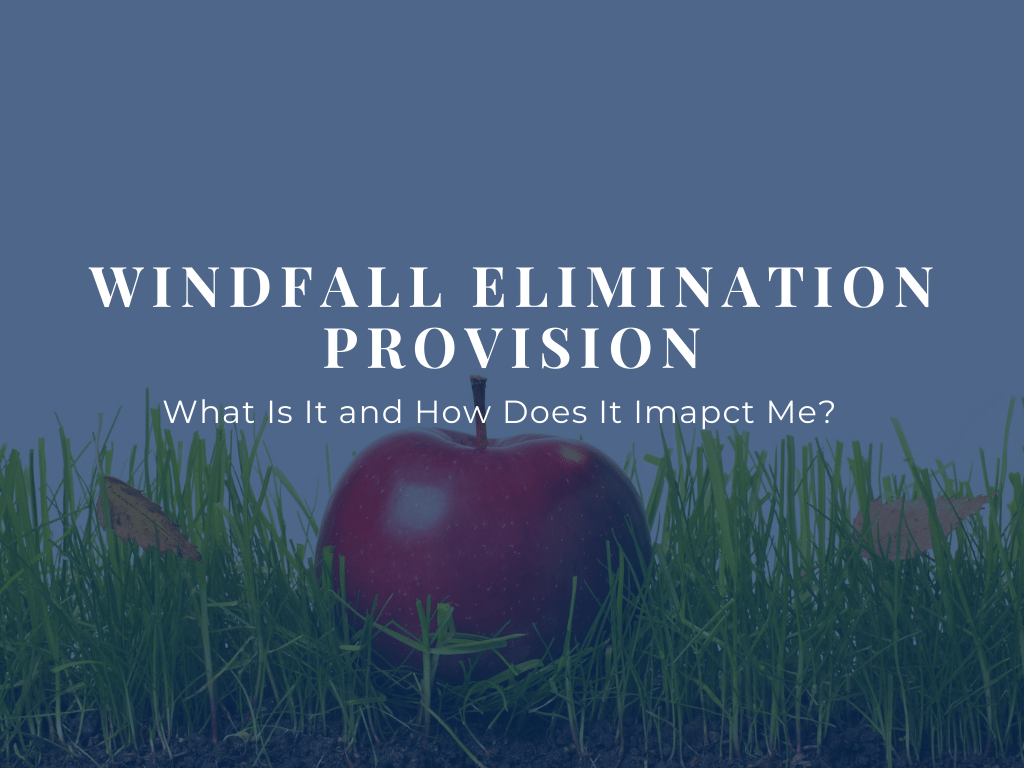
Many of us are not particularly fond of surprises, especially later in life and certainly not when we are looking to understand what our Social Security benefit will be upon retirement. But if you are eligible for a pension based on work you did for a government entity or nonprofit organization and did not pay the Social Security tax on your wages, you may be in for a surprise.
Known as the Windfall Elimination Provision (WEP), this potential reduction in Social Security benefits is a federal law that impacts those who have worked in a job where pay was subject to Social Security tax withholding, and also have worked in another job where Social Security tax is not withheld. Employees in the public sector like teachers or in the civil service are the prime examples, but if your employer was outside the U.S. you may also be affected.
Social Security Amendments of 1983
The WEP was part of a broader series of changes to the Social Security Act implemented by the 98th Congress in April of 1983. Included in this legislation was a gradual increase in what the government considers to be the full retirement age in addition to making some benefits subject to income tax for higher income individuals. The amendments also broadened the overall scope of the Social Security system, covering all Federal employees hired on or after January 1st, 1984. If you would like to read even more, here is a link to the Social Security Administration’s explanation of the WEP provision.
Intent of the WEP
To understand the objective of the WEP, it is helpful to consider the situation prior to 1983. If your primary job had not been covered by Social Security, when it came time to retire, your Social Security benefits were calculated as if you were a long-term, low-wage worker.
Since your Social Security benefits are determined based on your lifetime earnings for which Social Security taxes were paid, benefits are proportionately higher for workers with lower lifetime earnings. This is a progressive feature of the original Social Security Act. So, the WEP was enacted to prevent local, state and federal government employees from receiving artificially inflated Social Security benefits.
Which Beneficiaries Are Affected by WEP?
Public sector employees that are covered under the State Teachers Retirement System (STRS) or the Public Employees Retirement System (PERS) are among the largest groups affected by the Windfall Elimination Provision. Members of the Civil Service Retirement System (CSRS) and employees of overseas entities or non-profit organizations who did not participate in FICA payroll-tax withholding are others.
Please keep in mind though, the WEP only applies to those who are receiving both a public pension and Social Security benefits.
How Do You Calculate WEP?
The Social Security Administration (SSA) offers an online calculation tool that allows you to enter the proper variables to determine how the WEP impacts your individual situation. Please see the SSA.gov WEP Calculator form.
Conclusion About WEP and You
While there are a relatively small number of current and future retirees who are affected or will be affected by the Windfall Elimination Provision, it makes a great deal of sense for that group to seek out help to get clarification on their particular situation.
First steps should be opening a “my Social Security” account if you have not already done so. Also, SSA staff can answer questions about this topic and others at 800-772-1213.
Conversations with an Investment Adviser Representative (IAR) of a Registered Investment Adviser firm can also help you understand the nuances of the WEP and give you recommendations on how to make the most of your Social Security benefits.
Looking for a Financial Advisor for You?
If you are currently looking for help with financial planning, contact us. We are happy to schedule an introductory meeting at your convenience.
The opinions and recommendations expressed herein are those of Carnegie Investment Counsel. The material was prepared by or obtained from sources which we believe to be reliable, but accuracy is not guaranteed. Any opinions expressed herein are subject to change without notice and are not intended as a recommendation to purchase or sell a security. Past performance is no guarantee of future results. Investment advisory services are offered by Carnegie Investment Counsel, an SEC registered investment adviser. Registration as an investment adviser does not imply a certain level of skill or training. Carnegie does not provide legal, insurance, or tax services. For a detailed discussion of Carnegie Investment Counsel and its investment advisory services and fees, see the firm’s Form ADV on file with the SEC at www.adviserinfo.sec.gov



